Day 25: The Day as a Cadet 2nd Engineer
As the cadet 2nd engineer, I start my day at 0600 with breakfast and a coffee. At 0645 I meet with the other student leaders on the ship for a short meeting going over operations for the day, safety topics, and the goods and bads from the day before. After morning quarters, I proceed to make a round of the engine room. I focus on equipment such as fuel/lube oil purifiers, fuel/lube oil strainers, fuel/lube oil pumps, coolers, fuel skids, and steam related systems (hot well, feed pumps, Aux. Boiler, Exhaust Gas Boiler, etc.) The reason I focus on these systems is because they fall under my responsibility as the cadet 2nd engineer.
At 0800, my workday begins with a fuel transfer. Depending on the transfer, the fuel may need to be dosed with a lubricity modifier, in which I do the calculations for beforehand. The reason why we do fuel transfers every day, is to keep up with the fuel the engines burn throughout the day. Depending on the day, this number usually averages around 15 metric tons of fuel a day. After the transfer, I am usually assigned a job to last me until lunch. As of today, it involved replacing and cleaning the fuel oil burner tip in the Aux. Boiler and assembling the newly cleaned Diesel Generator purifier.
At 1200, it is my job to provide the ships engine noon report to the Chief Engineer. The noon report numbers are a summary of the performance and changes the engine room had in a 24-hour period. Among many other things, it helps us visualize things like water production, fuel usage, fuel transfers, waste oil transfers, and engine hour counters.
At 1300 the 2nd engineer usually assigns me work to do throughout the afternoon. Today, it involved cleaning a couple of fuel oil strainers that I noticed were dirty during my morning fuel oil transfer. After that, I helped the 2nd engineer calibrate the discharge valve for the fire and general service pump. It was jamming itself shut, so we reset the fully closed position of the valve. After, we tested it to make sure it was fully functional.
At 1600 I do boiler water and cooling water testing. Water testing is important because the quality of water that we put into our systems can have a really big impact on the components within the systems. Having proper water chemistry can prevent things like corrosion, scale build up, foaming, etc. Based on the chemistry, we dose the systems with the chemicals they need for proper operation. This usually concludes my workday. I then go to dinner, workout, and hang out with friends the remainder of the night.
Post By: 2/C Brody Hathorne, MET Delta Company, Cadet 2nd Engineer
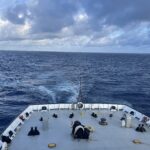
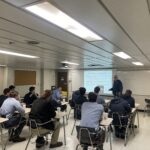
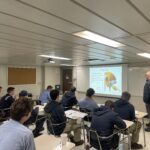
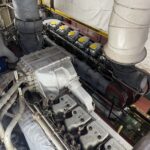
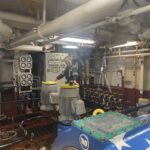
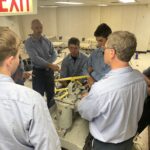
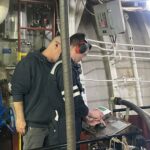
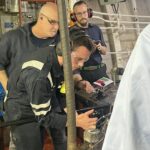
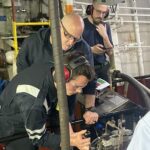

Latest 2024 Summer TSSOM Cruise
- Meredith Spotts’ Cruise ReviewAs cruise comes to a close, seventy-odd days after our departure from Castine, I am left to reflect on one of the most unique experiences I have been through- and a quick apology for my lack of updates during this portion of cruise (sorry, Mom!) The ports we visited were beautiful, but incredibly busy, with […]
- Day 72: Arrival to PortlandGood morning, Cruise Blog fans. Today, the State of Maine made its arrival in Portland. It was a peaceful transit from Boston to Portland. We moved slowly under the power of the electric motor, supplied by 3 of our diesel generators. As far as I know, this has been the first time it has been […]
- Day 71: Almost HomeThis morning the Training Ship State of Maine made its arrival into Boston. It was an exciting day because this was the closest glimpse to home that many of us have had in almost fifty days. The excitement began at around 0700, just after our morning muster when we took on a Boston Harbor pilot. We […]
- Cruise Return to Portland and LivestreamThe TSSOM will arrive in Portland, Maine, on July 16, 2024, at the Portland Ocean Terminal. This is the final stop of the 2024 Summer Training Cruise, and students will begin disembarking on Thursday, July 18, starting at 12:00. Please join us in welcoming back everyone aboard after a successful voyage, either in person or […]
- Day 69: Finals and FlashlightsBetween having our two written final exams and our engineering system assessment called “flashlights,” training day 13 was a day that everyone dreaded, juniors and freshmen alike. Alpha company was the last company to have their final assessments, which some may have viewed as a luxury. As a member of Alpha company, I can assure […]
- Day 67: Goodbye CanadaIt was a cold and dreary day when we departed from St. John’s this morning. It was a bittersweet departure just as the gray skies and the rain sprinkling on the deck might’ve suggested. Our departure left everyone with a feeling of completion, a terminus, because St. John’s was our last foreign port before our […]









